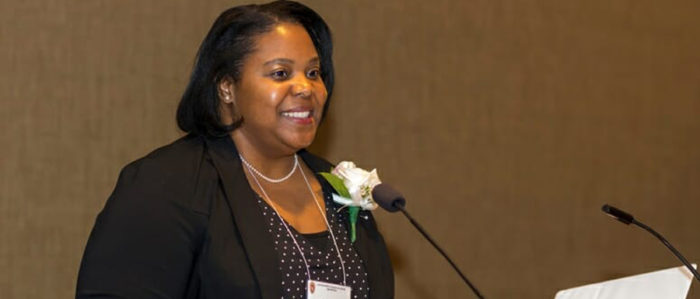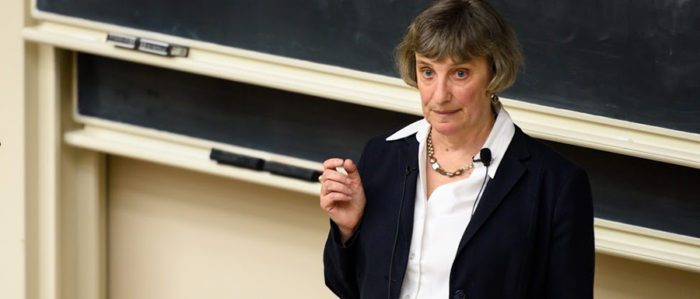Twelve faculty members — nine of them from the College of Letters & Science — have been chosen to receive this year’s Distinguished Teaching Awards, an honor given out since 1953 to recognize the university’s finest educators.
Chancellor Rebecca Blank and Provost Sarah Mangelsdorf will present the awards April 11, 2018, at a 5 p.m. ceremony at the Fluno Center, 601 University Ave. The ceremony, sponsored by the Office of the Secretary of the Faculty, is free and open to the public.
L&S Recipients
Philip Brown, Professor of Geoscience
Chancellor's Distinguished Teaching Award
Throughout his career, Philip Brown (right) has been the welcoming face of the undergraduate majors program, directly responsible for influencing the career paths of generations of students. He has made an immeasurable impact on the success of the department, teaching most of the graduating seniors in one course or another. He has been largely responsible for the continuity of the well-regarded Wasatch-Uinta Summer Field Camp, a six-week active learning experience in the mountains near Park City, Utah, that instructs students drawn from five universities in the Midwest. Under his directorship, this program won the ExxonMobil/Geological Society of America Field Camp Excellence Award in 2013.
Thomas Brunold, Professor of Chemistry
Chancellor's Distinguished Teaching Award
Thomas Brunold exemplifies the characteristics of excellence, innovation and leadership. He has brought high standards of excellence and innovation to a large variety of undergraduate and graduate courses. Although he teaches classes of more than 300 students on a regular basis, he is known for his unusual accessibility, his passion and his genuine concern for his students. Devotion to one's students means adapting one's own behavior and methods to maximize effectiveness. He has routinely pushed himself to incorporate new techniques into the classroom. His graduate and undergraduate courses are notable for their unique development of innovative materials. One overarching goal of his graduate courses concerns the incorporation of interactive exercises that enable students to actively explore complex phenomena, such as the origins of spectroscopic features of molecules, the creation of molecular orbital diagrams or the simulation of normal modes of vibration.
Jerome Camal, Assistant Professor of Anthropology
Chancellor's Inclusive Excellence Award
Students find Jerome Camal's teaching to be stimulating, challenging, eye-opening and inspiring. Camal, shown here during a sound capture walk as part of his Anthropology of Sound course, does an amazing job teaching by example, deeply engaging teaching assistants in thinking about and discussing the attributes of the best teachers they have had and then having the TAs work in small groups to develop a classroom exercise for students that would make use of the best practices they had identified. In the process, he shares with them his own evolution in teaching. He has developed a couple of new courses for the department that build on his ethnomusicology background. One is Anthro 237, Music, Race, and Culture in the Caribbean, and the other is Anthro 330, the Anthropology of Dance. In both courses, he utilizes strategies that fully engage students through multiple senses - listening, feeling, thinking and moving.
Ellen Damschen, Associate Professor of Integrative Biology
Chancellor's Inclusive Excellence Award
Ellen Damschen is known for empowering students to develop critical thinking skills that allow them to succeed in their career and in life. Damschen, shown with students conducting independent research in Muir Woods, is a strong role model as a female faculty member, teacher and scientist. She empowers students to be independent scientists and thinkers through active engagement at all levels of learning and research. Damschen works especially hard to address gender and other inequalities in the classroom and in research. She runs a major research program, modeling what it means to be a successful woman in science and providing opportunities for students at all levels to actively engage in the research process. Damschen stands out in her ability to use teaching approaches that are grounded in the literature, especially regarding gender differences in students' learning, to empower her students.
Simon Gilroy, Professor of Botany
Emil H. Steiger Award
Simon Gilroy has a true gift for using amusing analogies and creative demonstrations in lectures to engage and excite students. He does this through his unusual ability to see a key concept hidden among a forest of detailed facts and terms and then encapsulate that core idea in an accessible and memorable way. Additionally, he has a manner that sets introductory biology students at ease and empowers them to approach even complex material with a sense of confidence. Gilroy has a rare ability to build interdisciplinary teams of students and foster an environment in which they can let their creativity loose. He also has a great enthusiasm for public engagement and outreach. His lab offers interactive booths for the public at diverse outreach events, including the Wisconsin Science Festival. Gilroy is not just a highly successful and well-funded research scientist but also a creative, engaging and highly impactful teacher and outreach ambassador.
Nancy Rose Marshall, Professor of Art History
Chancellor's Distinguished Teaching Award
Nancy Rose Marshall's distinctive achievements in teaching fall into three principal categories: innovations in the classroom/pedagogy; course and curriculum development; and mentoring. While developing an international reputation as a leading scholar of Victorian art, she continues to devote considerable energy to achieving excellence in the classroom. In Art History 202, she has always insisted from the start on moving about the large lecture hall free of notes, but she has never settled on working from fixed lectures or sticking with the same format. She changes her reading assignments every semester, and often tries to bring in contemporary debates about art or issues in the news to demonstrate art history's relevance. She also designs creative assignments making use of popular culture, which elicits students' creative instincts.
David McDonald, Professor of History
Chancellor's Distinguished Teaching Award
Since his arrival at UW-Madison in 1988, David McDonald has taught rigorous and innovative classes that have held students spellbound due to his knowledge, intelligence and funny down-to-earth style. Students and colleagues alike praise McDonald for his intellectual and pedagogical creativity; his ability to make learning both relevant and exciting; his skill at breaking down the tasks involved in historical analysis and academic writing; his ability to convey historical methods clearly to students through illuminating lectures; and how he facilitates discussions and thoughtful, carefully designed assignments. He teaches from both the head and heart, knowing exactly what he wants students to learn from each lecture and assignment. McDonald draws on his own deep knowledge of the subject to elicit their full attention and draws them in with his genuine care for and commitment to their learning.
Erica Simmons, Assistant Professor of Political Science
Kiekhofer Award
Erica Simmons is a scholar of comparative politics, with a regional focus on Latin America and a thematic focus on contentious politics and social movements. She has also published important work on ethnographic methodology, advancing understanding of how comparative ethnography can contribute to causal identification. An innovative scholar, she brings this innovation to bear on her teaching, in and out of the classroom. Simmons forges deep connections with her students, and as a mentor and advisor motivates them to continue their studies well beyond the courses she teaches. She works with students on independent research, fostering in them an appreciation of social science methods. Always encouraging students' intellectual development, Simmons promotes a classroom environment that is both remarkably participatory and inclusive, and inspiring them to continue their studies in law or professional school or in their careers.
Michael Thornton, Professor of Afro-American Studies
Chancellor's Distinguished Teaching Award
Michael Thornton continuously showcases the newest scholarship on current social issues while his own work on multi-ethnic identity has been in the vanguard of ethnic studies/inter-group scholarship. He has continuously received outstanding evaluations from his students, even among those who found his courses exceptionally demanding. His students repeatedly commented on how he challenged them to rethink their assumptions, how his courses changed their lives, and how knowledgeable he is. They also noted that despite the often-contentious subject matter, he created both a safe environment and an intellectually rigorous classroom climate where diverse ideas and perspectives could be openly and honestly debated. This is a remarkable skill, perhaps never more so than in our current fractious political climate.
Campus Recipients
Daniel J. Klingenberg, Professor of Chemical and Biological Engineering
Chancellor's Distinguished Teaching Award
Daniel Klingenberg has been a member of the chemical and biological engineering faculty for more than two decades. During that time, he has made extraordinary contributions to the educational mission of the department and the College of Engineering. He is an expert in rheology and transport phenomena and brings that expertise to the classroom when he regularly teaches one of the core junior-level undergraduate classes, CBE 320, Introductory Transport Phenomena. Despite the fact that he is teaching in his field of expertise, he intuitively understands why students struggle with the material and he empathizes with them. He has a unique ability to explain concepts and illustrate ideas in ways that help students grasp the material while still retaining the necessary rigor and mathematical complexity.
Majid Sarmadi, Professor of Design Studies
Van Hise Outreach Teaching Award
Beyond Majid Sarmadi's academic accomplishments is a deep commitment to sharing his considerable expertise outside of the classroom in order to help as many people as possible. He does so with passion and ingenuity, taking initiative as needed to continually connect with new audiences. A chemist by training, his research has been disseminated through a variety of engaging and novel teaching methods that have impacted diverse learners, from high school students to state legislators. He is an expert in sustainability and as such, he sees it as his responsibility to educate anyone who is interested in the impact of our consumption and lifestyle upon the environment. Sarmadi has created a variety of forums and learning opportunities to make a difference and empower individuals and industries to take action and change.
Miriam Seifter, Assistant Professor of Law
Class of 1955 Teaching Excellence Award
Miriam Seifter has been at the Law School since 2014, and her outstanding teaching has already won her the Law School's 2017 Teacher of the Year award, a rare feat for a professor so early in her career. Her near-perfect course evaluation scores, attained in teaching large core courses in the Law School's curriculum, tell part of the story of her remarkable classroom abilities. Students comment on how clearly she explains difficult and dense concepts. She's also known for the extraordinary extent to which she prepares for and organizes her courses. In her classes, Seifter uses the traditional law school Socratic method, cold-calling students on the readings for the day. Students remark how it keeps the class engaged without being intimidating. Students consistently praise her approachability and sense of humor, both of which further enhance her ability to communicate dry and difficult materials.
Story courtesy of University Communications.













